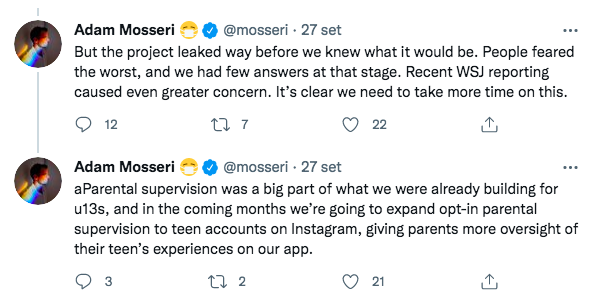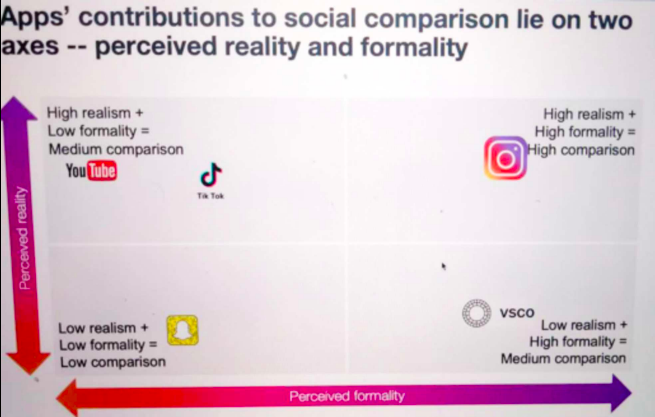The suspension of Instagram Kids and the exploitation of data
On the 27th of September, the head of Instagram, Adam Mosseri announced on the Instagram blog that the project by the name of Instagram Kids (a version of Instagram that was designed to be safe for tweens) had been paused, yet he stated that “building ‘Instagram Kids’ is still in their minds the right thing to do.” (Mosseri).
This break has most certainly occurred following the numerous Wall Street Journal’s leaked presentations along with parents, experts, and regulators concerns (The Guardian) and attorneys general from 44 states and territories encouraging Facebook to discontinue the project (CBCN).

Even though the main issue the media is focusing on is the problem of the well-being of kids under 13, the broader, more concealed issue lays on the data that Facebook has and how they decide to use it.
What we know and can start from as The Washington Post’s reports is that “Right now, no one under 13 is allowed to create an Instagram account because of the risks of sexual exploitation, inappropriate content, bullying and more that the platform and its peers present […] Though encouraging, the promise doesn’t mean an end to all data collection — some level of which is key to the functionality and personalization for which Facebook products are known.” (The Washington Post).
One of the leaked presentations from the Wall Street Journal shows the data Facebook had on teen’s well-being on the app. The graphs show that 66% of teen girls on Instagram experienced negative social comparison and that 52% of teen girls who experienced negative social comparison on Instagram, said it was caused by images related to beauty and 32% of teen girls said that when they felt bad about their bodies Instagram made them feel worse (The Wall Street Journal).

We can undoubtedly say that Facebook was aware of the damage the app had on the younger users. The leaked presentation goes on to show how content on the app also contributed to depression and how “higher standards decrease self-esteem, until they’re recognized as being unattainable” (The Wall Street Journal). The role of social media in teens is therefore very important and recognized by Facebook officials, and so it’s Instagram that is seen as having the highest impact on teenagers (followed by Snapchat and TikTok), on contributing to social comparison and depression.
We thus learned that Facebook not only had full access and awareness of the ill-being of kids on the app, but the handling of data was used to their marketing interests and not for what should have been the well-being of the younger users. This is obviously connected and raises a parallel but slightly deeper issue which is the use Facebook does of our data.
As quoted by Kate Crawford “Any data on human subjects inevitably raise privacy issues, and the real risks of abuse of such data are difficult to quantify” (Nature, previously cited in Berry 2011).
And if typically the truth behind the researchers uses of our data, which are generally stored and gathered, are unknown to the average user, it is important to bear in mind that “Users are not necessarily aware of all the multiple uses, profits, and other gains that come from information they have posted” (Crawford, 673). If the adult-standard user does not have much control on it, what can be done with kids data is not only something kids cannot consent to, but something illegal under the COPPA rule.
In the US, as reported by the Federal Trade Commission, there’s a Rule that protects kids under 13 years of age from the collection of data: “COPPA imposes certain requirements on operators of websites or online services directed to children under 13 years of age, and on operators of other websites or online services that have actual knowledge that they are collecting personal information online from a child under 13 years of age.” (Federal Trade Commission, Protecting America’s Consumers, 16 CFR Part 312, Children’s Online Privacy Protection Act of 1998, 15 U.S.C. 6501–6505 Children’s Privacy) So, whilst on one hand the collection of data for kids under 13 is forbitten in the US -Facebook assured that Instagram Kids would have been an ad-free platform with full control of the usage from the parents- on the other hand the bigger argument that angers the public is instead the assumption on a Facebook’s idea to farm kids’ data.
And, as reminded, the view on data is different once we enter a marketing point of view and “The market sees Big Data as pure opportunity: marketers use it to target advertising, insurance providers use it to optimize their offerings, and Wall Street bankers use it to read the market.” (Crawford, 664)
The discussion under what is data and the uses that corporations make of it, is something that, clearly, goes far behind the recent Instagram kid controversy.
What is common knowledge is that social media companies, as is the case here with Facebook have access to most data that are not public domain, and they have the rights to decide the use of it. And without going too deeply into the strictly ethical question of the use of data, it’s instant the link between who has the data and what they do with it. We’ve seen above how Facebook was aware of the photo-sharing platform’s effects on young people’s mental health (Grossman) but did not do anything to improve the well-being of the users they declare being their priority.
Back in 2018, YouTube was under fire for the allegation of collecting kids data and the complaint led by Center for Digital Democracy and Campaign for a Commercial-Free Childhood mentioned how Google had made substantial profits from the collection and use of personal data from children on YouTube and how its illegal collection has been going on for many years and involved tens of millions of US children (Pakistan & Gulf Economist). The matter was solved by, not only, opening a YouTube Kids app that did not collect data and complied with COPPA’s clauses but especially, by paying a $170 Million for Alleged Violations of Children’s Privacy Law (Federal Trade Commission).
So, the Instagram kids app suspension not only revealed which sad and damaging effects Instagram has on kids and especially the awareness Facebook had on the issue, but has proven, once again, that the usage and diffusion of data could be a benevolent thing if it was used to protect its users and not only to mainly capitalize on them.
Work Cited & Bibliography
Danah Boyd & Kate Crawford. “Critical Questions for Big Data”, Information, Communication & Society, 2012, 15:5, 662-679. http://dx.doi.org/10.1080/1369118X.2012.678878
Heller, Rafael. “The data on children’s media use – The director of research for Common Sense Media shares recent findings on kids’ online lives and digital media habits. “, The online lives of young people, Phi Delta Kappan, Volume 99, Issue 6, March 2018, Pages 20-26. doi: https://doi-org.proxy.uba.uva.nl/10.1177/0031721718762418
Venturini T, Jacomy M, Jensen P. What do we see when we look at networks: Visual network analysis, relational ambiguity, and force-directed layouts. Big Data & Society. January 2021. doi:10.1177/20539517211018488.
“YouTube under fire for illegally collecting kids data.” Pakistan & Gulf Economist, vol. 37, no. 16, 22 Apr. 2018. Gale General OneFile, link.gale.com/apps/doc/A535838345/ITOF?u=amst&sid=bookmark-ITOF&xid=5bd1a29a.
Grossman, Matt. “Facebook to Halt Instagram Kids Project amid Pressure from Lawmakers, Parents Groups.” The Wall Street Journal, Dow Jones & Company, September 27th 2021, https://www.wsj.com/articles/facebook-pauses-instagram-kids-project-11632744879.
“Instagram for Kids Paused after Backlash.” BBC News, BBC, September 27th 2021, https://www.bbc.com/news/technology-58707753.
Mosseri, Adam. “Pausing “Instagram Kids” and Building Parental Supervision Tools”, Instagram Blog, September 27, 2021, https://about.instagram.com/blog/announcements/pausing-instagram-kids
Wells, Georgia, et al. “Facebook Knows Instagram Is Toxic for Teen Girls, Company Documents Show”, Wall Street Journal, September 14th, 2021, https://www.wsj.com/articles/facebook-knows-instagram-is-toxic-for-teen-girls-company-documents-show-11631620739#
“The Senate holds a hearing Thursday about the social network’s impact”, The Wall Street Journal’s coverage, The Wall Street Journal Staff, September 29th 2021. Wsj.com/articles/facebook-documents-instagram-teens-11632953840
“Teen girls body image and social comparison on Instagram – an exploratory study in the U.S.”, The Wall Street Journal, September 29, 2021. https://s.wsj.net/public/resources/documents/teen-girls-body-image-and-social-comparison-on-instagram.pdf
“Instagram for Kids? Facebook Should Tread Carefully: Building an App That Encourages the Youngest to Use Social Media Carries Risks.” Washington, D.C: WP Company LLC d/b/a The Washington Post, 2021. Print.
Milmo, Dan. “Facebook pauses work on Instagram Kids after teen mental health concerns”, September 27th 2021, https://www.theguardian.com/technology/2021/sep/27/facebook-pauses-instagram- kids-teen-mental-health-concerns
Feiner, Lauren. More than 40 attorneys general ask Facebook to abandon plans to build Instagram for kids, CNBC, May 10 2021, https://www.cnbc.com/2021/05/10/attorneys-general-ask- facebook-to-abandon-instagram-for-kids-plans.